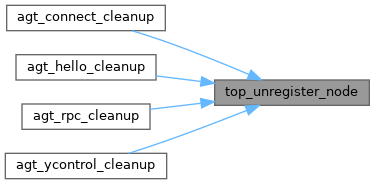 |
yumapro
25.10-4
YumaPro SDK
|
 |
yumapro
25.10-4
YumaPro SDK
|
Top Message Dispatch via XML Text Reader. More...

Typedefs | |
| typedef boolean(* | top_handler_t) (ses_cb_t *scb, xml_node_t *top) |
| callback function template for a top handler More... | |
| typedef boolean(* | top_val_handler_t) (ses_cb_t *scb, val_value_t *msgval) |
| callback function template for a top VAL handler More... | |
Enumerations | |
| enum | top_mode_t { TOP_MODE_NONE , TOP_MODE_SERVER , TOP_MODE_CLIENT } |
| top used by client and server differently yp-controller uses both at the same time More... | |
Functions | |
| void | top_init (void) |
| Initialize the Top Elelment Handler. More... | |
| void | top_cleanup (void) |
| cleanup Top Element Handler More... | |
| status_t | top_register_node (const xmlChar *owner, const xmlChar *elname, top_handler_t handler, top_mode_t topmode) |
| Register a top entry handler function. More... | |
| void | top_unregister_node (const xmlChar *owner, const xmlChar *elname, top_mode_t topmode) |
| Remove a top entry handler function. More... | |
| top_handler_t | top_find_handler (const xmlChar *owner, const xmlChar *elname, top_mode_t topmode) |
| Find the top_handler in the topQ. More... | |
| status_t | top_register_val_node (const xmlChar *owner, const xmlChar *elname, top_val_handler_t handler, top_mode_t topmode) |
| Register a top entry VAL handler function. More... | |
| void | top_unregister_val_node (const xmlChar *owner, const xmlChar *elname, top_mode_t topmode) |
| Remove a top entry VAL handler function. More... | |
| top_val_handler_t | top_find_val_handler (const xmlChar *owner, const xmlChar *elname, top_mode_t topmode) |
| Find the top_val_handler in the topQ. More... | |
Top Message Dispatch via XML Text Reader.
The inbound messages are processed 1 XML node at a time. Message handlers register for top-level elements such as <rpc> or <hello> and the top dispatcher will invoke the proper callback when the start-tag for this message is seen.
| typedef boolean(* top_handler_t) (ses_cb_t *scb, xml_node_t *top) |
callback function template for a top handler
| scb | session control block; source of input The session manager will only stream one message to this function and wait for it to return. |
| top | very first node of the incoming message This allows a single handler to support multiple top nodes, and also contains the attributes present in the node |
| typedef boolean(* top_val_handler_t) (ses_cb_t *scb, val_value_t *msgval) |
callback function template for a top VAL handler
The callback function MUST CONSUME THE msgval!!! It is expected that the val_value_t will be added to another structure (e.g., app-layer msg) and freed after use
| scb | session control block; source of input The function is expected to handle the msg |
| msgval | entire message parsed as a val_value_t MUST FREE WITH val_free_value!!!! |
| enum top_mode_t |
| void top_cleanup | ( | void | ) |
cleanup Top Element Handler


| top_handler_t top_find_handler | ( | const xmlChar * | owner, |
| const xmlChar * | elname, | ||
| top_mode_t | topmode | ||
| ) |
Find the top_handler in the topQ.
| owner | owner name |
| elname | element name |
| topmode | client or server mode |

| top_val_handler_t top_find_val_handler | ( | const xmlChar * | owner, |
| const xmlChar * | elname, | ||
| top_mode_t | topmode | ||
| ) |
Find the top_val_handler in the topQ.
| owner | owner name |
| elname | element name |
| topmode | client or server mode |
| void top_init | ( | void | ) |
Initialize the Top Elelment Handler.


| status_t top_register_node | ( | const xmlChar * | owner, |
| const xmlChar * | elname, | ||
| top_handler_t | handler, | ||
| top_mode_t | topmode | ||
| ) |
Register a top entry handler function.
| owner | owner name (really module name) |
| elname | element name |
| handler | callback function for this element |
| topmode | registration mode (client or server) |

| status_t top_register_val_node | ( | const xmlChar * | owner, |
| const xmlChar * | elname, | ||
| top_val_handler_t | handler, | ||
| top_mode_t | topmode | ||
| ) |
Register a top entry VAL handler function.
| owner | owner name (really module name) |
| elname | element name |
| handler | callback function for this element |
| topmode | registration mode (client or server) |
| void top_unregister_node | ( | const xmlChar * | owner, |
| const xmlChar * | elname, | ||
| top_mode_t | topmode | ||
| ) |
Remove a top entry handler function.
This will not affect calls to the handler currently in progress, but new calls to top_dispatch_msg will no longer find this node.
| owner | owner name |
| elname | element name |
| topmode | client or server mode |


| void top_unregister_val_node | ( | const xmlChar * | owner, |
| const xmlChar * | elname, | ||
| top_mode_t | topmode | ||
| ) |
Remove a top entry VAL handler function.
This will not affect calls to the handler currently in progress, but new calls to top_dispatch_msg will no longer find this node.
| owner | owner name |
| elname | element name |
| topmode | client or server mode |
